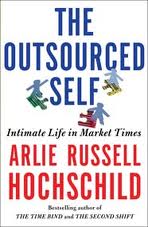The Outsourced Self?
Devra Torres | May 18, 2012 | 10 cmts
This is not a book review. I haven't yet read the new book by one Arlie Russell Hochschild. But I want to address the same subject: the striking trend toward paying strangers to do things once thought too personal to entrust to another: what she calls "outsourcing the self."

Just how personal are these things? That depends. On the more prosaic side, there's the unremarkable delegation of tasks that are too onerous or time-consuming to attend to oneself: you could call it "outsourcing" when an assemblage of villagers would arrange a division of labor to avoid duplication of everyone's efforts. Nothing revolutionary here.

At the other extreme is the futile attempt to pay someone to do on your behalf something so properly personal that it cannot truly be delegated at all--like the fictional merchant who wanted to save his soul but had no time to pray all the novenas he thought would get the job done. So he hired a servant to say his prayers for him. The details escape me, but, as you can imagine, it didn't end well for him.
Between these two extremes--things that have always been outsourced, and things that can't be outsourced at all--are oodles of possibilities (and oodles of prospective profits for the enterprising young huckster). Here are a few, in approximate order of outlandishness:
- Event planner
- Closet organizer
- Gravesite tender
- Holiday gift buyer
- Potty trainer
- "Nameologist" (to choose your baby's name)
- Life coach
- Love coach
- Mourner for hire
- "Wantologist" (to help you figure out what you want)
- Friend for rent
- Grandma for rent
- Womb for rent

So, some things just can't be outsourced.

Some things can be--but should they? (Hint: NO!)

And plenty fall somewhere in between.
Paying a professional for help or advice is no novelty, but the trend to delegate every little thing to an enterprising "expert" is plainly running amok. What are we to make of its moral status? What does it mean about how we see the person?
I would answer with a resounding "It depends."
Of course, for most of us, it's a moot point. Who has the luxury of agonizing over whether to pay the wantologist or the water bill? But must we attend to every single aspect of our complicated lives personally, if it's feasible to do otherwise? Of course not. If something's unpleasant, are we forbidden to delegate it? No, not necessarily.
It's good to be on the lookout, though, for luxuries masquerading as necessities.

Let's please be aware that the army of smarmy marketers paid to create "felt needs" in our hearts are not our friends.

Some of the outsourcing craze just comes of our addiction to convenience, our lack of once-universal domestic skills, (planting a potato, replacing a zipper) and our extreme mobility: we may live too far away from Grandma to depend on her for babysitting or emotional support, but human beings don't need these "commodities" any less than they ever did.

Some of the in-between cases are a matter of the prudent weighing of obligations and circumstances. For example, you're not outsourcing childrearing itself if you hire a babysitter once a week. But what about all day, every day? When we lived in Barcelona, I knew of a woman who was worried about her daughter's "speech delay," only to discover that she was speaking fluent Tagalog with the Filipina maid who was always around when her mother wasn't--which was just about always. She hadn't intended to delegate motherhood itself, but for all practical purposes--at least from her little girl's point of view--she had.
Is there anything wrong with some of the other options the book details: relationship advisers, wedding planners, or hired "friends"? Are these morally neutral, intrinsic evils, or just dumb ideas?

It's a big subject, but here are some starting points:
VOCATION, IDENTITY AND DUTY
Which actions, exactly, are central to your very identity and purpose in life? The question, "What if I outsourced that?" can be a useful thought experiment to clarify what we might already know intuitively. What if I pay a local teenager to help me organize my kitchen? What if I hire a tutor to teach my own teenager calculus? What if I hire a stranger to visit my elderly parents? What if I outsource the composition of my college application essay? What if I pay an Indian woman with mixed feelings and no other job prospects to carry my unborn baby to term?
The question often answers itself.
DELEGATOR AND DELEGATEE
Some transactions shouldn't exist at all, but the moral culpability of exploiter and exploited may vary. I wouldn't tolerate my son buying that application essay, but I would object more vehemently to the one who marketed it to him.
THE FINANCIAL ANGLE
Some object to the outsourcing craze out of a distaste for capitalism in general. But buying and selling aren't intrinsically evil. In a better world, we'd all be surrounded by generous (and highly qualified) friends and family with whom we could freely exchange all manner of help and advice. If that isn't the case, though, we can hire a babysitter or therapist without any qualms of conscience.
On a larger scale, the trouble is, the rich have the ability to treat everything as a commodity, including the lives of the poor.

They can delegate everything, even the starving and the praying. (There, I knew I'd find a way to fit Credence Clearwater Revival into this post.) But we shouldn't envy them for it. They're rich in convenience and luxury, poor in human rapport and camaraderie.
AVOIDING PERSONAL CONNECTION
This brings up an interesting question, though. Do we really want personal connection? Aren’t we sometimes seeking an excuse to avoid it? In The Sun Also Rises, protagonist Jake Barnes, recently returned from a harrowing sojourn in Spain, revels in the simplicity he finds in France:
“…I overtipped [the waiter]. This made him happy. It felt comfortable to be in a country where it is so simple to make people happy. You can never tell whether a Spanish waiter will thank you. Everything is on such a clear financial basis in France….No one makes things complicated by becoming your friend for any obscure reason. If you want people to like you you have only to spend a little money. I spent a little money and the waiter liked me. He appreciated my valuable qualities….It would be a sincere liking because it would have a sound basis. I was back in France.”
If outsourcing fosters this kind of thing, we can safely label it unsavory.
So tell me: have you read The Outsourced Self? Do you have some savory or unsavory experience with outsourcing to share? What do you think?


Comments (10)
TowerofBabble
May 21, 2012 8:42am
This is an interesting topic. About surrogate pregnancies, I remember hearing about a woman who outsourced her pregnancy in order to keep her figure. There is no serious defense for that. However, what if a couple, for whatever reason, can't have a child. Is it wrong to solicit different housing for the biological parents' child outside the mother's womb? For example, if her body can't support, or rejects, a baby, is it wrong to outsource that? I guess what I'm asking here is, how big a role does intent play in the morality of this particular outsourcing?
Devra Torres
May 21, 2012 1:44pm
Good point! Intent can increase or decrease the culpability, but even the best of intents can't make it right. So it becomes a worse action if it's done, say, for a frivolous reason, and there are enormous possibilities for exploitation of the woman who carries the child--not just possibilities, unfortuanately, either. In India, it's big business, exposing women to enormous medical risks and uninformed consent, taking advantage of economically vulnerable people with enormous financial incentives.
Another ethical problem arises when the sperm or egg are from someone other than the "parents." When my mother was explaining this to me, she pointed out that adultery "without the fun" is still adultery. God's law is still against it, because it's not the "fun" per se that He objects to; it's the interference of a third party in the marriage.
Also, In the processes of uniting egg and sperm the baby gets treated like a manufactured product, and something to which the parents have a right, rather than a gift. Even if the parents' intentions and motivations are good, this "interference" and "manufacturing" are what's objectively going on. The unitive and procreative goods of marriage are being ripped apart.
Devra Torres
May 21, 2012 1:57pm
Clearly, there's more to talk about here. It's very important not to demonize those who suffer from infertility, or minimize what they're going through. This is a source of suffering for enormous numbers of people.
But besides the problems mentioned above, the unethical ways of "outsourcing" motherhood, fatherhood and pregnancy often lead to the destruction of countless "extra" embryos. Others are frozen indefinitely; others are used as fodder for experiments. The whole thing falls far short of respect for any of the persons involved.
The good news is, places like the Paul VI institute, and Dr. Russell Hilger's NaPro Technology and our member Anna Halpine's FEMM are doing work that respects women, babies and marriage and also has a higher success rate than unethical alternatives. I once introduced the "infertile" daughter of a friend to the Paul VI Institute, and she's now a mother--so this is not just theoretical!
Katie van Schaijik
May 21, 2012 4:17pm
I read recently of a terrible story of a surrogate mother carrying a baby who was found to have some genetic defect. The baby's parents wanted an abortion. The surrogate mother didn't want to do it.
I think the essential wrong of surrogate motherhood becomes painfully clear in a case like that.
Stephen Granderson
May 21, 2012 5:50pm
I once read a National Geographic article about robotics in which an engineer who works on developing "humanoid" robots was seriously suggesting that a robot which sufficiently resembled himself could serve to visit with his lonely mother when he himself was too busy to visit her. That would seem to be a bizarrely cold-hearted type of outsourcing; telling my mother (or wife, or children) to make do with a lifeless robotic imitation of myself because I'm to busy to give them my real self. I believe, and hope, that any real mother would be very hurt and offended at any son who suggested such a thing to her.
Devra Torres
May 21, 2012 7:42pm
Yes, Katie, I've read about cases like that, too. I think it's standard practice to agree in advance to an abortion under certain circumstances. There are fascinating studies, too, showing that once a woman has been pregnant, cells from that baby remain with her for the rest of her life. It might seem clear on paper: the source of the genetic material is the "real" mother, and the woman who carries the baby has no objective connection to the child, but the reality is more mysterious.
Stephen, welcome to the conversation! I have heard of people paying others to visit their elderly parents on their behalf, and was going to use the theoretical example of someone doing so with a parent with severe dementia, who presumably wouldn't know the difference. "Bizarre and coldhearted": exactly! The more things like this become thinkable, the less people are able to recognize them as obviously evil.
Jules van Schaijik
May 21, 2012 10:17pm
Devra & Stephen,
Sherry Turkle, whose article we'll discuss during our next reading circle, also talks about some disturbing ways in which we are starting to replace real relationships (i.e. with other human beings) with robotic ones. This type of outsourcing is already here, and much farther along than I would have believed.
Turkle mentions, for instance, a graduate student who confided to her "that she would trade in her boyfriend 'for a sophisticated Japanese robot' if the robot could produce what she called 'caring behavior.'" The student, who was in earnest, said she "was looking for a 'no-risk relationship' that would stave off loneliness."
Even more poignant is the case of "Miriam," an elderly woman in a nursing home, whose son no longer visits her because they always fight. Now Miriam has Paro, a therapeutic robot in the shape of a cute, cuddly, baby harp seal. Paro can make eye contact, and "has 'states of mind' affected by how it is treated." And Miriam feels she has a real connection with Paro. She talks to "him", and comforts "him," and is herself comforted through the process.
It's worth reading the entire example here (pages 8-9)
Devra Torres
May 21, 2012 11:02pm
People will go to surprising lengths to avoid the complications of dealing with unpredictable, fallen human beings. Someone told me once that some men will enter into homosexual relationships not because they're inclined that way but because it's a way of avoiding all the complications and unknowns of dealing with a woman--something like what Jake Barnes describes in The Sun Also Rises, about money in France. Neither party is pretending the relationship is personal; it's an exchange of a commodity. (I don't mean all men in such relationships are motivated in this way.)
We value control more and more, but other human beings are no more controllable than they ever were. We want things customized, and, taken to its extreme, this mindset will lead us to prefer a cooperative, predictable robot--or a person who acts like one--to a real but autonomous human being.
Katie van Schaijik
May 21, 2012 11:17pm
You remind me of a Charles Williams novel, Descent into Hell (I think it was.) One of the characters is attracted to a woman at his workplace, but she's aloof. So he creates through his imagination a woman the same in every respect, except that she conforms herself completely to his will.
The reader sees him descending into a self-enclosed hell.
I remember reading it, and thinking of Scheler's saying that "reality is resistance."
But your post made me think more of the small outsourcings-of-self we might fall into. How often do we wish others could decide a difficult moral question for us? Don't we even do this often in our praying? "Lord, just tell me what you want me to do and I'll do it," when I think, very often, what he wants is exactly for us to taking responsibility for ourselves.
The students who often went to Fr. Wojtyla for help and adives would help them mostly by listening and asking them questions, and then reminding them, "You must decide."
In a way, it's how we become real and substatials moral beings. Selves.
Devra Torres
May 22, 2012 12:07am
It's easy to lose sight of the importance of truly acting, instead of just producing the right answer, the right decision, like a vending machine. I remember once praying that we would know what decision to make, about a move, and I finally realized it didn't matter where we lived as much as it mattered that we did what we were meant to do when we got there, or when we stayed where we were. The heart of it was not: A or B, but that we make of it, and ourselves, what we were meant to. It's not as if, once you pick "A"--and you get it right, "A" is God's will--then you're off the hook and don't have to choose and act and become someone anymore. And THEN the trick is to see the choosing and acting and becoming as an adventure, not a burden.